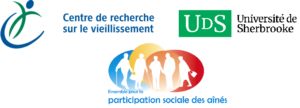 Portal of groups and research projects of Dr. Mélanie Levasseur, SUITE
Portal of groups and research projects of Dr. Mélanie Levasseur, SUITE
Visiting relatives, going out for a walk with a friend, participating in a hobby: at an advanced age, one out of four seniors would like to participate in more activities, but cannot. However, well-targeted interventions with these people can facilitate their social participation and contribute to their well-being: this is demonstrated by the research program of Mélanie Levasseur, professor-researcher at the School of Rehabilitation of the Faculty of Medicine and Health Sciences (FMSS), University of Sherbrooke (UdeS) and at the Research Center on Aging (CdRV), CIUSSS de l'Estrie – CHUS.
The aging of the population is one of the greatest public health challenges, explains Mélanie Levasseur. In the next 20 years, the number of older adults will double in Canada and nearly half of them will experience disabilities at one time or another. Research shows that social participation, that is, leaving the home to participate in social or leisure activities, is one of the main protective factors for the maintenance of well-being and health. We must therefore find ways to support our seniors so that they have an active social life.
Mélanie Levasseur received more than one million dollars in grants over five years from the Canadian Institutes of Health Research (CIHR – Foundation) to test and validate a continuum of interventions to improve social participation in the older population. She counts on the collaboration of fifteen researchers and the support of public health to validate three interventions.
Personalized citizen assistance for social participation (APIC)
This intervention allows community-dwelling older adults with a loss of autonomy to engage in more social and leisure activities. Through weekly three-hour individual meetings with a personalized attendant trained and supervised by professionals, the older adults are led to target activities that are important to them in connection with their life project.
Lifestyle Redesign
It is a preventive occupational therapy intervention used in California to support the development of healthy and meaningful life routines. Through a series of group meetings, older adults reflect on their activities and lifestyle habits (nutrition, physical exercise, finances, social life, transportation, etc.) with the aim of reshaping certain aspects of their lives. These meetings are combined with an individual follow-up with the occupational therapist.
Thanks to these meetings, I managed to resume certain activities, testified Denise Lavigne, a resident of Sherbrooke who participated in the program's pilot study in Quebec. I started reading in English again. I also changed some life habits by integrating stretching, muscle strengthening, and balance exercises into my routine.
Public health to benefit older adults
Professor-researcher Mélanie Levasseur also collaborates with the Public Health Department of the CIUSSS de l'Estrie – CHUS to identify the environmental characteristics that best promote active and healthy aging, whether it is in the organization of urban space, proximity to recreational centers, or the pedestrian environment, etc. She uses data from major population surveys such as the Estrienne population health survey to support managers and decision-makers identify the right targets for action.
Nearly one in three seniors in private households lives alone, recalls Dr. Mélissa Généreux, director of public health at the CIUSSS de l'Estrie – CHUS. It is essential to support projects promoting their social participation and community integration.
Promote older adults' autonomy
Our mission is to promote older adults' autonomy, says professor-researcher Nicole Dubuc, director of the CdRV. This research program, which employs a dozen people, is an exemplary illustration of how research, the health, and social services network and community organizations can together contribute to older adults' well-being and their healthy active aging.
The Faculty of Medicine and Health Sciences has chosen to promote translational research, that is to say the abolition of barriers between researchers, medical teams and patients, in order to promote interdisciplinary collaboration,” says Professor Jean-Pierre Perreault, vice-dean for research and higher studies at the FMSS. The work of professor-researcher Levasseur goes in this direction: it reminds us that a person's health does not depend only on medical aspects but on everything that can contribute to their well-being and promote their active life.
Taken from Integrating into the community promotes well-being and health, Communication from the CIUSSS de l'Estrie – CHUS.